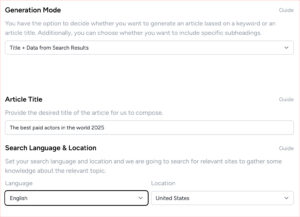In the ever-evolving landscape of digital marketing, understanding the metrics that can make or break your online presence is crucial.
SEMrush Domain Authority is one such metric that’s garnered significant attention from SEO professionals and digital marketers alike. But what exactly is it, and how can it influence your website’s performance on search engines?
In this article, we’ll dive deep into the intricacies of SEMrush Domain Authority, exploring its importance, how it’s calculated, and what actionable steps you can take to improve it.
Whether you’re a seasoned marketer or just starting, knowing the ins and outs of this metric can give you a competitive edge in the digital arena.
Understanding Domain Authority
To grasp the concept of Domain Authority, you first need to understand how search engines rank websites. Search engines like Google use complex algorithms to determine where a website appears in search results. They consider factors like content quality, backlinks, and user engagement.
Domain Authority, a metric created by Moz, predicts how well a website will rank on search engine result pages (SERPs). You can think of Domain Authority as a score that indicates the strength and credibility of your site. It ranges from 1 to 100, with higher scores suggesting a better ability to rank.
To improve your Domain Authority, focus on creating high-quality content, earning reputable backlinks, and optimizing your on-page SEO. By doing so, you’ll increase your site’s overall performance in search engine rankings.
Importance of SEMrush Metrics
SEMrush metrics provide crucial insights that help you understand and improve your website’s performance. By analyzing data like organic traffic, keyword rankings, and backlink profiles, you can pinpoint areas needing improvement. You’ll see which keywords drive the most traffic and which pages perform best, allowing you to refine your SEO strategy.
Additionally, SEMrush metrics help you monitor your competitors. By comparing your site’s performance against competitors, you can identify gaps and opportunities. You can also track changes over time, ensuring you stay ahead in the ever-evolving digital landscape.
Ultimately, leveraging SEMrush metrics lets you make informed decisions, optimize your site more effectively, and achieve better search engine rankings. This way, you’re not just guessing; you’re strategizing with precision.
Factors Influencing Domain Authority
Several key factors influence your website’s Domain Authority, each playing a vital role in determining your site’s overall credibility and ranking potential.
First, the number and quality of inbound links are crucial. High-quality backlinks from reputable sites can significantly boost your Domain Authority.
Second, the quality of your website content matters; engaging, relevant, and well-structured content can attract more visitors and links.
Third, your site’s overall SEO health, including on-page SEO elements like meta tags, headers, and keyword optimization, contributes to Domain Authority.
Lastly, user experience factors such as site speed, mobile-friendliness, and low bounce rates are essential.
By understanding these factors, you can better position your site in search engine rankings.
Improving Your Domain Authority Score
Boosting your Domain Authority score involves a strategic combination of high-quality content, robust SEO practices, and a strong backlink profile.
Start by consistently producing valuable, engaging content that attracts your target audience. Make sure to optimize your on-page SEO elements, including meta tags, headers, and keywords.
Building a solid backlink profile requires earning links from reputable, high-authority sites. Guest posting, creating shareable infographics, and reaching out for collaborations can help achieve this.
Improve your website’s user experience by ensuring fast load times, mobile-friendliness, and easy navigation. Regularly update and audit your site to fix broken links and remove outdated content.
By focusing on these strategies, you’ll gradually see improvements in your Domain Authority score, boosting your site’s overall credibility and visibility.
Interpreting SEMrush Data
Understanding SEMrush data is crucial for making informed decisions about your SEO strategy.
When you dive into SEMrush, you’ll find a plethora of metrics like organic search traffic, backlinks, and keyword rankings. Each piece of data can help you pinpoint what’s working and what’s not.
Pay attention to metrics like the Authority Score, which indicates the overall quality and SEO performance of your domain. Also, the Backlink Analytics will show you the strength and diversity of your backlink profile, essential for building authority.
By regularly monitoring these metrics, you can adjust your strategies to improve your site’s visibility and performance.
Don’t overlook the detailed reports, as they offer actionable insights that can drive your SEO efforts forward.
Comparing Domain Authority Across Sites
When comparing domain authority across sites, focus on how each site’s score can influence its ranking potential and overall visibility in search engines. Higher domain authority indicates a stronger likelihood of ranking well for relevant keywords, which can drive more organic traffic to the site.
By examining competitors’ domain authority, you can identify which sites are performing better and understand the competitive landscape.
Look at the backlinks, content quality, and user engagement metrics that contribute to these scores. This gives you a clearer picture of what strategies might be effective for your own site.
Remember, domain authority isn’t static; it changes based on factors such as link-building efforts and content updates. Regularly compare your site’s authority with competitors to stay ahead in the search rankings.
Tracking Domain Authority Progress
Regularly tracking your site’s domain authority helps you gauge the effectiveness of your SEO strategies and identify areas for improvement. By monitoring changes over time, you can see what’s working and what’s not.
Use SEMrush to access detailed reports and track metrics consistently. Set benchmarks and compare your performance against competitors to understand your standing in the industry.
Watch for trends rather than focusing on day-to-day fluctuations. Significant drops or gains in domain authority can indicate major shifts, prompting you to investigate further.
Graphs and historical data from SEMrush can help visualize your progress. Regularly updating your tracking efforts ensures you’re always informed about your site’s health, making it easier to adapt and refine your SEO tactics.
Enhancing SEO Strategies with SEMrush
Leveraging SEMrush’s robust tools and features can significantly enhance your SEO strategies and drive better results.
Start by using the Keyword Magic Tool to find high-volume, low-competition keywords that can boost your organic traffic.
SEMrush’s Site Audit tool helps you identify and fix technical SEO issues, ensuring your site runs smoothly.
Don’t forget to use the Backlink Analytics tool to analyze your backlink profile and discover new link-building opportunities.
You can also track your rankings with the Position Tracking tool to see how your keywords are performing over time.
Finally, SEMrush’s Competitor Analysis feature lets you monitor your competitors’ strategies, so you can stay one step ahead.
Integrate these tools into your workflow to optimize your SEO efforts effectively.
How does SEMrush’s Domain Authority metric differ from other similar metrics, such as Moz’s Domain Authority or Ahrefs’ Domain Rating?
When comparing SEMrush’s Domain Authority with Moz’s Domain Authority or Ahrefs’ Domain Rating, note that SEMrush emphasizes its unique algorithm for evaluating domain strength.
This provides a different perspective on website authority and trustworthiness.
Are there any known limitations or criticisms of SEMrush’s Domain Authority metric?
There are some known limitations and criticisms of SEMrush’s Domain Authority metric.
It’s important to consider factors like the scope of data and potential biases when evaluating websites based on this metric.
Can SEMrush Domain Authority be affected by changes in a website’s hosting or server performance?
Changes in your website’s hosting or server performance can impact SEMrush Domain Authority.
Ensure stable hosting, fast loading times, and reliable server performance to maintain or improve your Domain Authority score.
Conclusion
In conclusion, mastering SEMrush Domain Authority can significantly boost your website’s SEO performance.
By understanding the factors that influence your score and consistently tracking your progress, you can make informed decisions to enhance your online presence.
Utilizing SEMrush metrics effectively will not only improve your domain authority but also help you stay ahead in the competitive digital landscape.
Keep optimizing and analyzing data to achieve lasting success in your SEO efforts.





